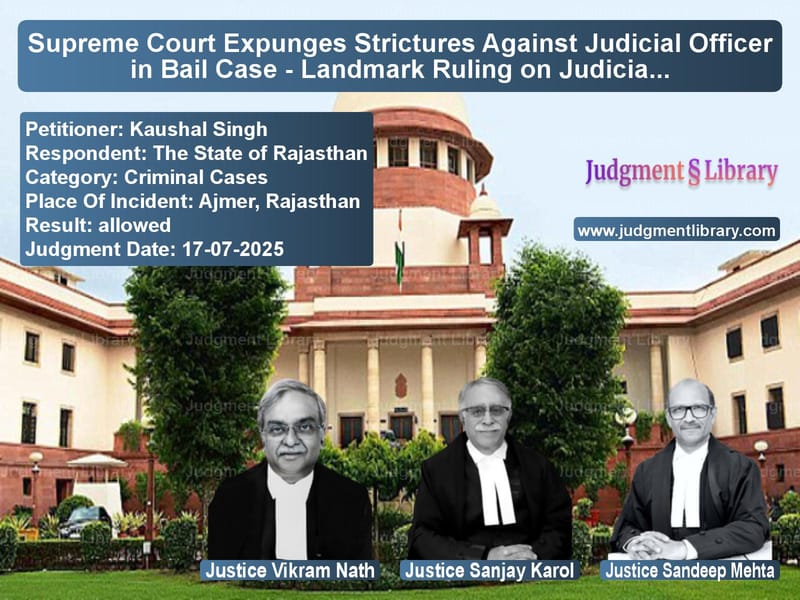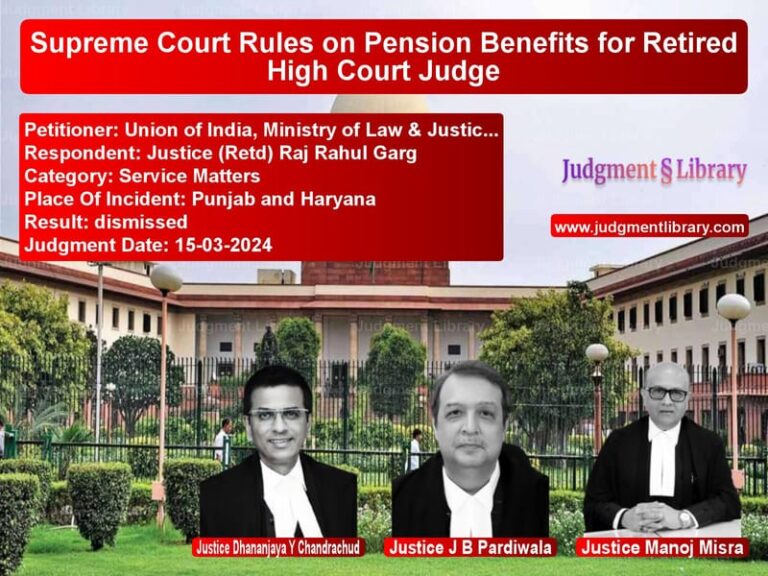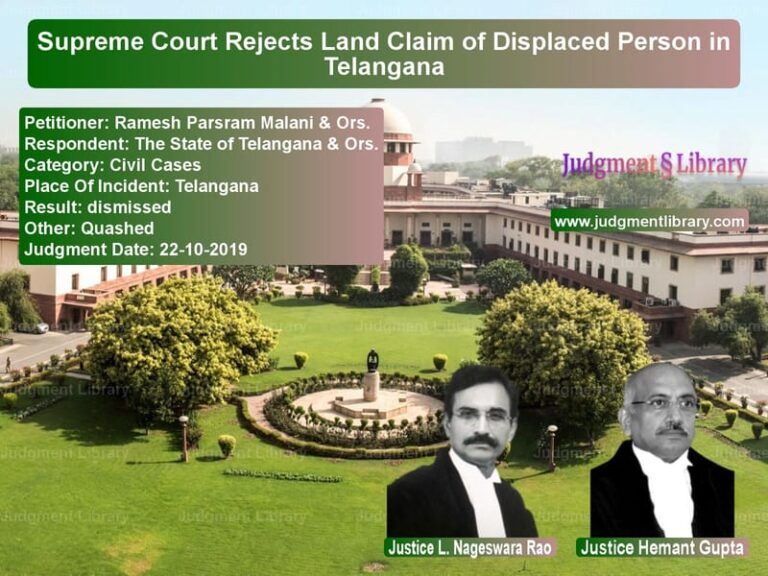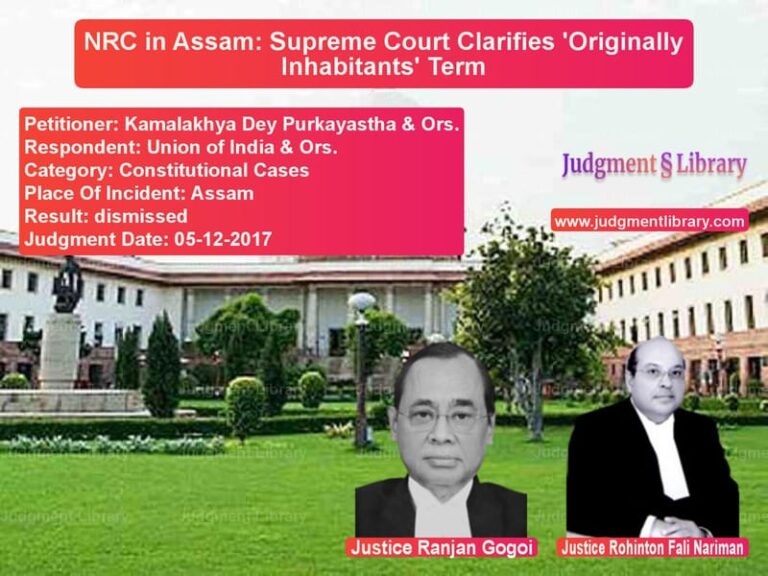Supreme Court Expunges Strictures Against Judicial Officer in Bail Case – Landmark Ruling on Judicial Discipline
In a significant ruling that reinforces the principles of natural justice and judicial discipline, the Supreme Court of India has expunged strictures passed by the Rajasthan High Court against a judicial officer who had granted bail to an accused in a criminal case. The judgment, delivered on July 18, 2025, marks an important milestone in protecting judicial officers from public criticism without due process and establishes crucial guidelines for maintaining the dignity of the judiciary.
The case originated from a bail matter that had spiraled into a controversy involving judicial conduct and the appropriate manner of addressing perceived errors by subordinate judicial officers. The appellant, Kaushal Singh, a Judicial Officer of the District Judge Cadre in the judicial services of the State of Rajasthan, approached the Supreme Court to challenge the strictures passed against him in an order dated May 3, 2024, by a Single Judge of the Rajasthan High Court.
The background of the case reveals a complex web of criminal proceedings and bail applications. First Information Report No. 224 of 2022 was registered at Police Station Gegal, District Ajmer on October 23, 2022, against various accused persons including Sethu @ Angrej and Sethu @ Haddi, for offences punishable under Sections 147, 323, 341, 325, 307, 427 read with section 149 of the Indian Penal Code, 1860.
The High Court had granted bail to Sethu @ Haddi on December 16, 2022, observing that the allegation of inflicting the lethal injury was against the accused Sethu @ Angrej, and the case of Sethu @ Haddi was different. However, when Sethu @ Angrej’s bail application came before the appellant-Judicial Officer on December 19, 2022, he granted bail applying the principle of parity and based on the order passed by the High Court in the case of Khet Singh and Another v. State of Rajasthan.
The controversy arose because the appellant-Judicial Officer seemed to be carrying some misconception that the life-threatening injuries were attributed to Sethu @ Haddi, and thus, the case of the applicants before him was not different from the said accused. Crucially, while considering the bail applications of accused Sethu @ Angrej, the appellant-Judicial Officer omitted to consider his criminal antecedents.
The complainant in the FIR moved for cancellation of bail granted to Sethu @ Angrej, which was allowed by the Sessions Judge on July 6, 2023. The Sessions Judge observed that the learned counsel for the accused Sethu @ Angrej misled the Court while seeking bail on his behalf. When Sethu @ Angrej approached the High Court challenging the cancellation of his bail, the Single Judge not only rejected the bail application but passed strictures against the appellant-Judicial Officer.
The High Court observed that the appellant, being a Judicial Officer, had passed the order granting bail to Sethu @ Angrej in a grossly inappropriate and cavalier manner while ignoring the criminal record of the said accused. The High Court further noted that the accused Sethu @ Angrej was the principal accused in the case, as he caused the lethal injury to the injured Pappu.
The High Court concluded that this act of the appellant-Judicial Officer tantamounted to indiscipline, negligence and so also, ignorance and disobedience of the orders/judgments passed by the High Court. Observing so, it was directed that the copy of the impugned order be placed before the Chief Justice of the Rajasthan High Court for perusal.
Aggrieved by these observations and strictures, the appellant-Judicial Officer approached the Supreme Court, setting the stage for a crucial examination of the principles governing judicial discipline and the appropriate manner of addressing errors by subordinate judicial officers.
The Supreme Court, in its landmark judgment, expunged the strictures passed by the High Court, relying on well-settled principles established through a catena of decisions. The Court referred extensively to the precedent in Re: ‘K’, A Judicial Officer, where the Supreme Court had dealt with the validity and legality of strictures passed by the High Court against a Judicial Officer serving as a member of the district judiciary.
The Court reproduced crucial paragraphs from the Re: ‘K’ judgment that laid down the fundamental principles governing such matters. The judgment noted that “under the constitutional scheme control over the district courts and courts subordinate thereto has been vested in the High Courts. The control so vested is administrative, judicial and disciplinary. The role of High Court is also of a friend, philosopher and guide of judiciary subordinate to it.”
The Court emphasized that “the strength of power is not displayed solely in cracking a whip on errors, mistakes or failures; the power should be so wielded as to have propensity to prevent and to ensure exclusion of repetition if committed once innocently or unwittingly. ‘Pardon the error but not its repetition’. The power to control is not to be exercised solely by wielding a teacher’s cane; the members of subordinate judiciary look up to the High Court for the power to control to be exercised with parent-like care and affection.”
The Supreme Court highlighted five crucial reasons why higher courts should refrain from passing strictures against judicial officers in their judgments. “Firstly, the judicial officer is condemned unheard which is violative of principles of natural justice. A member of subordinate judiciary himself dispensing justice should not be denied this minimal natural justice so as to shield against being condemned unheard.”
“Secondly, the harm caused by such criticism or observation may be incapable of being undone. Such criticism of the judicial officer contained in a judgment, reportable or not, is a pronouncement in open and therefore becomes public.” The Court noted the irreparable damage such public criticism can cause to a judicial officer’s reputation and career.
“Thirdly, human nature being what it is, such criticism of a judicial officer contained in the judgment of a higher court gives the litigating party a sense of victory not only over his opponent but also over the Judge who had decided the case against him. This is subversive of judicial authority of the deciding Judge.”
“Fourthly, seeking expunging of the observations by a judicial officer by filing an appeal or petition of his own reduces him to the status of a litigant arrayed as a party before the High Court or Supreme Court — a situation not very happy from the point of view of the functioning of the judicial system.” The Court noted the embarrassment involved when a judicial officer has to take the assistance of a legal practitioner who may be one practising before him.
“And last but not the least, the possibility of a single or casual aberration of an otherwise honest, upright and righteous Judge being caught unawares in the net of adverse observations cannot be ruled out. Such an incident would have a seriously demoralising effect not only on him but also on his colleagues.”
The Supreme Court clarified that it was not suggesting that any conduct of a subordinate judicial officer unbecoming of him and demanding a rebuff should be simply overlooked. However, the Court prescribed an alternative safer and advisable course: “The conduct of a judicial officer, unworthy of him, having come to the notice of a Judge of the High Court hearing a matter on the judicial side, the lie may be disposed of by pronouncing upon the merits thereof as found by him but avoiding in the judicial pronouncement criticism of, or observations on the ‘conduct’ of the subordinate judicial officer who had decided the case under scrutiny. Simultaneously, but separately, in office proceedings may be drawn up inviting attention of Hon’ble Chief Justice to the facts describing the conduct of the Subordinate Judge concerned by sending a confidential letter or note to the Chief Justice.”
The Court further relied on the three-judge bench decision in Sonu Agnihotri v. Chandra Shekhar & Ors, where the Supreme Court again implored that the Courts higher in the judicial hierarchy should refrain from commenting on the conduct and calibre of judicial officers. The Court in Sonu Agnihotri had observed: “There is a difference between criticising erroneous orders and criticising a Judicial Officer. The first part is permissible. The second category of criticism should best be avoided.”
The Supreme Court also took note of the practical challenges faced by the judiciary, observing that “the Judges are human beings. All human beings are prone to committing mistakes. To err is human. Almost all courts in our country are overburdened.” The Court highlighted the alarming judge-to-population ratio, noting that “in the year 2002, in the case of ‘All India Judges’ Association (3) and Ors. v. Union of India and Ors., this Court passed an order directing that within five years, an endeavour should be made to increase the judge-to-population ratio in our trial judiciary to 50 per million. However, till the year 2024, we have not even reached the ratio of 25 per million. Meanwhile, the population and litigation have substantially increased. The Judges have to work under stress.”
In the present case, the Supreme Court found that the strictures and scathing observations were made by the learned Single Judge of the High Court to the detriment of the appellant-Judicial Officer without providing him any opportunity of explanation or showing cause. Additionally, the Court noted that the entire foundation of the High Court’s order seemed to be based on the judgment in the case of Jugal v. State of Rajasthan, which stood reversed by the Supreme Court in Ayub Khan v. State of Rajasthan.
In this background, the Supreme Court held that “the strictures passed by the High Court against the appellant-Judicial Officer were uncalled for and hence, the same are expunged.” The impugned order was modified to that extent.
Before concluding, the Supreme Court made an important observation regarding bail applications and criminal antecedents. The Court noted that accounting for the criminal antecedents of the accused while considering bail applications has been the subject matter of concern for Courts across the country. The Court referred to the rules of the Punjab and Haryana High Court, which specifically provide that in every bail application, the petitioner shall mention whether he/she is/was involved in any other criminal case or not, and if yes, particulars and decisions thereof.
The Supreme Court recommended that “every High Court in the country should consider incorporating a similar provision in the respective High Court Rules and/or Criminal Side Rules as it would impose an obligation on the accused to make disclosures regarding his/her involvement in any other criminal case(s) previously registered.” The Court directed that a copy of its order be communicated to the Registrar Generals of all High Courts for consideration of incorporating similar rules.
This judgment represents a significant reinforcement of the principles of natural justice within the judicial system itself. By protecting judicial officers from public condemnation without due process, the Supreme Court has strengthened the institutional framework of the judiciary. The ruling balances the need for judicial accountability with the requirement of maintaining the dignity and independence of judicial officers.
The judgment also serves as an important reminder that while higher courts have the authority to correct errors in judgments of subordinate courts, this power must be exercised with restraint and in a manner that preserves the institutional integrity of the judiciary. The prescribed alternative of addressing concerns about judicial conduct through confidential administrative channels rather than public judicial pronouncements strikes an appropriate balance between accountability and dignity.
Furthermore, the Supreme Court’s recommendation for uniform rules regarding disclosure of criminal antecedents in bail applications addresses a significant practical challenge in the criminal justice system. This proactive approach demonstrates the Court’s commitment to systemic improvements while adjudicating individual cases.
In conclusion, the Supreme Court’s judgment in Kaushal Singh’s case represents a crucial milestone in judicial administration, reinforcing that the principles of natural justice and fair treatment must extend to all participants in the justice system, including judicial officers themselves. The ruling strengthens the foundation of judicial independence while maintaining appropriate mechanisms for accountability and correction of errors.
Petitioner Name: Kaushal Singh.Respondent Name: The State of Rajasthan.Judgment By: Justice Vikram Nath, Justice Sanjay Karol, Justice Sandeep Mehta.Place Of Incident: Ajmer, Rajasthan.Judgment Date: 17-07-2025.Result: allowed.
Don’t miss out on the full details! Download the complete judgment in PDF format below and gain valuable insights instantly!
Download Judgment: kaushal-singh-vs-the-state-of-rajasth-supreme-court-of-india-judgment-dated-17-07-2025.pdf
Directly Download Judgment: Directly download this Judgment
See all petitions in Bail and Anticipatory Bail
See all petitions in Legal Malpractice
See all petitions in Judgment by Vikram Nath
See all petitions in Judgment by Sanjay Karol
See all petitions in Judgment by Sandeep Mehta
See all petitions in allowed
See all petitions in supreme court of India judgments July 2025
See all petitions in 2025 judgments
See all posts in Criminal Cases Category
See all allowed petitions in Criminal Cases Category
See all Dismissed petitions in Criminal Cases Category
See all partially allowed petitions in Criminal Cases Category







